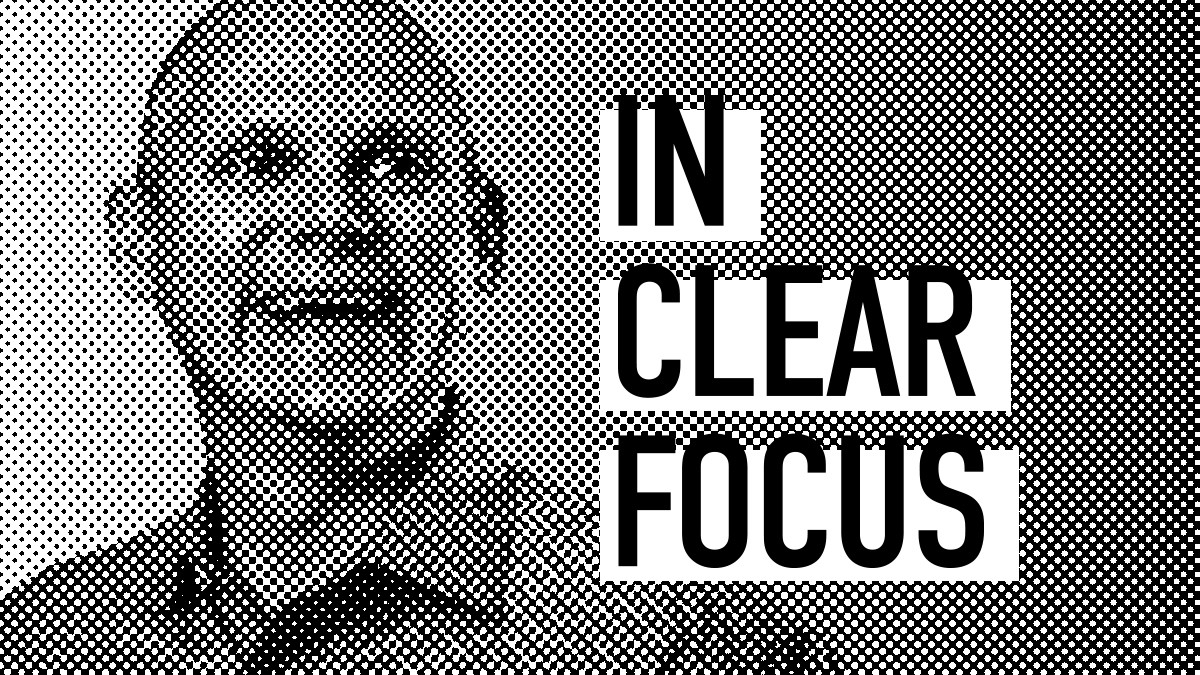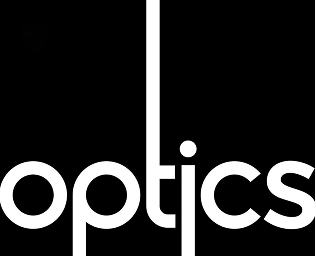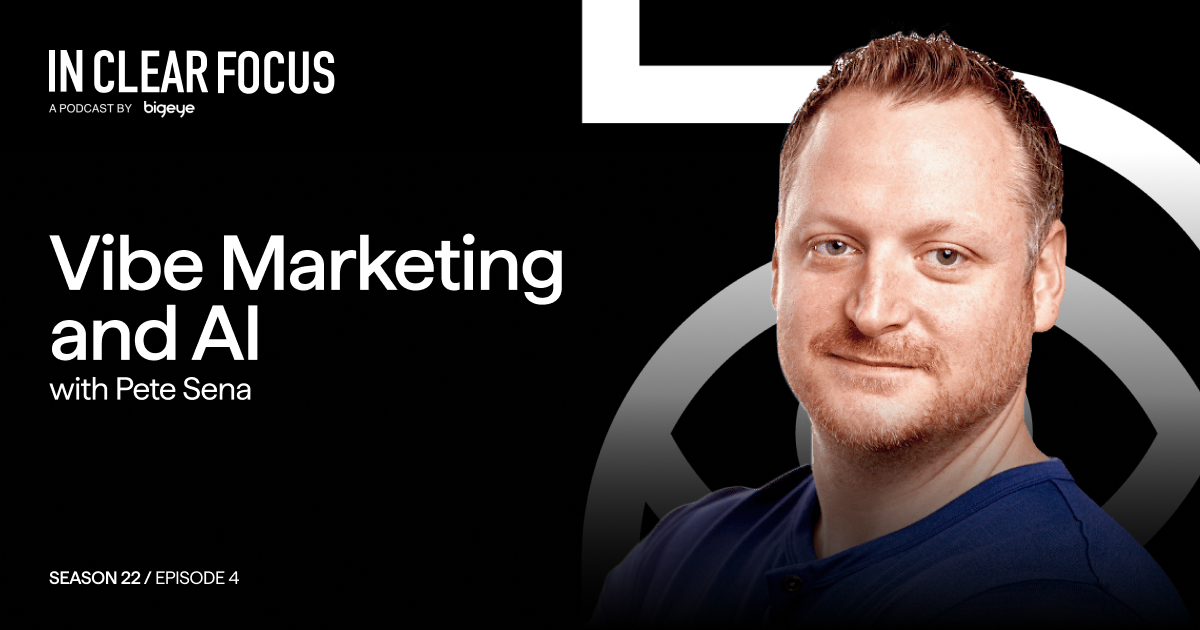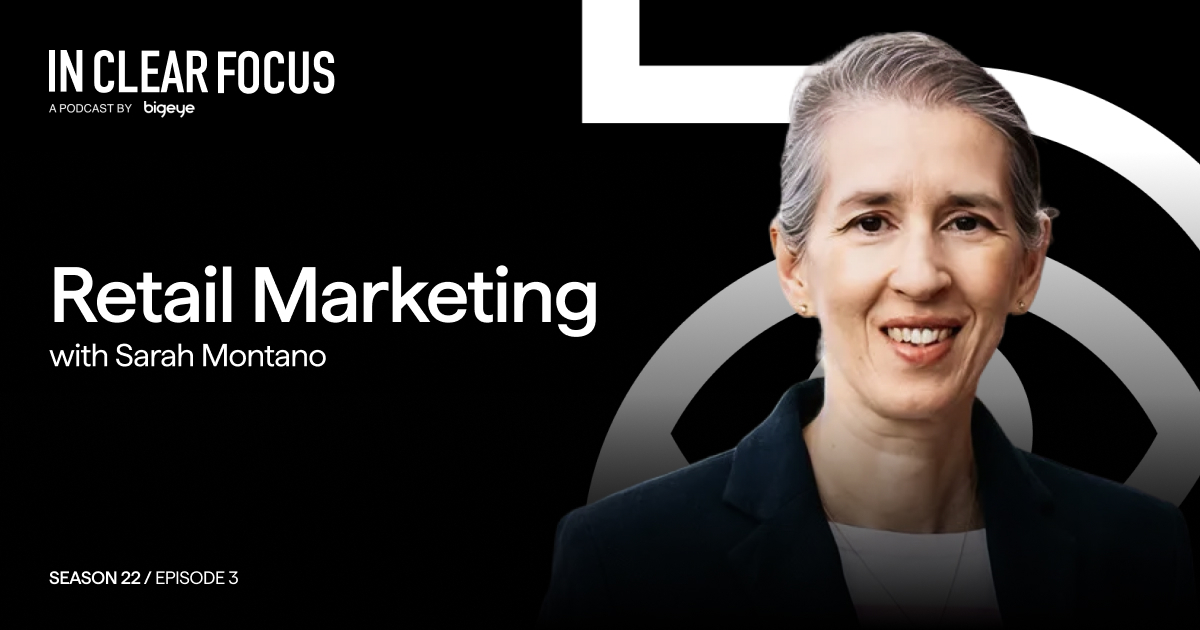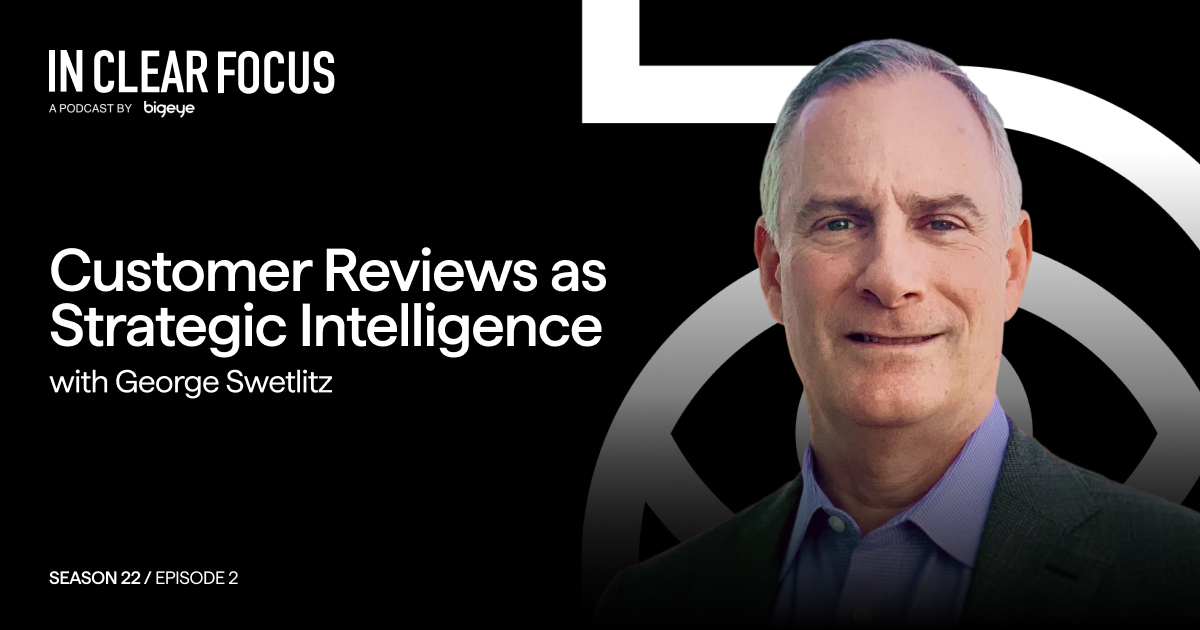Full-service advertising and influencer marketing agency Bigeye interviews serial entrepreneur and digital industry pioneer Ted Murphy on this week’s podcast.
IN CLEAR FOCUS: Bigeye’s podcast features Ted Murphy of IZEA, which provides influencer marketing software and services. On the podcast, Ted shares his entrepreneurial background from his first venture, a t-shirt printing company, to interactive agency MindComet, and the revolutionary but controversial Pay Per Post. Regarded as “the father of influencer marketing”, Ted talks candidly about challenges faced during COVID, startup funding strategies, and shares his take on social media and fake news.
Episode Transcript
Adrian Tennant: You’re listening to IN CLEAR FOCUS, fresh perspectives on the business of advertising produced weekly by Bigeye. Hello, I’m your host, Adrian Tennant VP of insights at Bigeye, an audience-focused, creative-driven, full-service advertising agency. We’re based in Orlando, Florida, but serve clients across the United States and beyond. Thank you for joining us. It’s my pleasure to be talking today to a real digital pioneer. Ted Murphy is an Orlando-based serial entrepreneur who has founded six companies since 1994. He’s raised over $90 million in both the private and public equity markets and has created over $2 billion in shareholder liquidity. Today, Ted is the Founder, Chief Executive Officer, and Chairman of IZEA, a company that provides software and services for influencer marketing. The company’s mission is to develop technology that helps marketers and creators connect. Ted is a prominent digital industry pundit, speaking and presenting on television and at conferences around the world, and has been featured in the Wall Street Journal, the New York Times,Wired, and Entrepreneur Magazine, among many others. Ted, welcome to IN CLEAR FOCUS.
Ted Murphy: Thank you very much. Happy to be here.
Adrian Tennant: So from a very young age, you knew that you wanted to be an entrepreneur. Could you tell us a bit about what led you to that and how you founded your first company?
Ted Murphy: Yeah. I come from a family of entrepreneurs. Growing up, my dad had everything from radio stations to a furniture store. He was the CEO of two different public companies, and I always just looked up to him. He was my hero. I admired everything that he did. And I got to the part of my dad’s experience as an entrepreneur. And because of that, I always wanted to be an entrepreneur. I started my very first company when I was in high school. I started a t-shirt printing company and at the time I actually didn’t have enough money to print any of the t-shirts that I designed. I would go around to my classmates and show them a piece of paper with the design. I collected all their money upfront. And when I finally had enough money to do my first run, then went out and started making t-shirts. It was a very primitive Kickstarter.
Ted Murphy: I have always been super passionate about entrepreneurism as well as marketing and technology.
Adrian Tennant: So Ted, I’ve been in the Orlando market for 15 years now, when I first arrived here, you were the founder and CEO of MindComet, the most respected web design and development agency in the region, working with clients like Disney, Turner Networks, Red Lobster, Burger King, Coors, and many other well-known brands. You founded MindComet in the 1990s, making you one of the web 1.0 pioneers. What were some of the highlights of that period for you?
Ted Murphy: That was such a fun period of my life. I was in my twenties. I thought I knew everything, but knew nothing. But because I thought I knew everything, we tried big, audacious projects and we were always experimenting and tinkering. And when I first started that company, the idea was that we would build these online experiences that were very grand in scope, and they were expensive projects for our customers, and they really were only able to be used by a very small portion of people that were on the internet at the time. Back then, most people had dial up modems. High-speed connectivity was not really a thing – I think a T1 line cost like $1,500 at the time, and it was at 1.5 megabits – but right out of the gate, our idea was that we were going to build these really rich experiences that had streaming video and lots of interactivity. And it was just a blast. We were really trying things that people had never done before. And that’s something, when I look back at what we did create, it was a very special and unique time.
Adrian Tennant: Well, in 2006, you left MindComet to found a new company called Pay Per Post, which was the first marketplace for advertisers to pay bloggers to write about products. First, what was the insight or idea that motivated you to establish the company?
Ted Murphy: Pay Per Post was really incubated inside of MindComet. In 2004, as we were building all these rich multimedia experiences, what we recognized was that the avenues that were available to us for online advertising consisted primarily of banner ads and search, and those mediums were not necessarily great for driving discovery of new experiences. Search was great if somebody knew what they were looking for, but when you were creating something new, they didn’t know what to search for. So we started reaching out to people that were on message boards, early MySpace users, very early bloggers. And we started asking them to create content about the sites that we launched. And what we recognized was that it was incredibly viral when we would get placements on any of these sites. But it was also very hard to scale. Like, we just couldn’t get enough content out there. So we decided that we were going to start paying people. And in the early days, we would give people gift cards or free products, but that also wasn’t very easy to scale. So then we decided that we were going to build a marketplace to allow these things to happen more easily. And at the time I was a really big user of eBay and I looked at what they built with their online marketplace. And then we started building Pay Per Post.
Adrian Tennant: Pay Per Post certainly attracted a lot of attention. It stirred up some controversy and spawned several imitators. You created the first platform for facilitating what we now call influencer marketing campaigns. Did you foresee back then that Pay Per Post was pioneering a business model that would one day be generating billions of dollars as it does today?
Ted Murphy: That was always the vision. You know, the big idea was that once people had the opportunity to create content online, publish that content, monetize that content, that everybody would want to do that. What I didn’t recognize when we started with Pay Per Post is that in a few years, the iPhone would be introduced. And that is really what accelerated this entire space. When everybody had the ability to create content on their phone, publish photos and videos, have access to social networks and ways to connect with other people much more efficiently, that is what allowed this influencer marketing space to really take off like a rocket ship. But in the beginning it was, as you said, it was incredibly controversial. This idea of paying people to create content on behalf of brands was somehow looked at differently because it was social media, even though it was happening in movies and it was happening in radio. You would hear the DJ say, “I went to McDonald’s this morning and got my McDonald’s coffee.” And that content wasn’t necessarily disclosed, but when people – it wasn’t disclosed as sponsored that is – but when people started creating that content on their social handles, it became very clear that that content was consumed a different way by the people who were either watching videos or looking through a social stream. And there wasn’t necessarily an expectation that there wouldn’t be a financial relationship between a social media influencer and a brand. And the big thing that we had to solve in the early days was how do we make sure that people understand that this content is sponsored, that we’re being transparent with them? And we establish a level of safety for the brand, the creator and the consumer.
Adrian Tennant: Now I understand that you have personally negotiated influencer marketing deals with some internationally known celebrities. Are you able to name some of the notable ones?
Ted Murphy: I’m not as involved in that these days, but one of the ones that were most interesting to me in the early days was we did the first sponsorship with Kim Kardashian on Twitter. We paid her $10,000 to do a post for Armani Jeans, which at the time, the average cost first a sponsored tweet was about $3. So this was unheard of, but she was really starting to gain some notoriety and she put this tweet out and it talked about her butt and the jeans and it crashed the Armani server! And that’s when I really understood just how powerful this could be when you mask the right brand with the right creator.
Adrian Tennant: Certainly today, it’s hard to imagine that there was ever a question that it would work, but it’s so interesting. So how did Pay Per Post evolve into IZEA, the company that you’re CEO of today?
Ted Murphy: After we incubated that inside of MindComet, it became pretty clear that there was a big business opportunity that it was going to take time and investment in order to really help it mature and create an industry around the vision. And that it was going to be incredibly capital intensive. So I wound up taking on some venture capital funds in 2006, spun out Pay Per Post from MindComet and made it its own entity. And part of that agreement with the venture capitalist is I couldn’t really have any ongoing involvement with MindComet and day-to-day operations. So that led me to split ways with MindComet, which was tough because that was my baby. And I had built that from the ground up. And as you said, we had enjoyed a lot of success, but in 2006, I had to kind of part ways and focus all my efforts on Pay Per Post, which then became IZEA a year later, as we started rolling out new products, designed for different types of activations, outside of sponsored blog posts.
Adrian Tennant: What products and services does IZEA offer for marketers?
Ted Murphy: So today what we have is a couple of categories of products and services. Our flagship is IZEA X Unity Suite, which is an enterprise influencer marketing platform that allows brands to go in, discover creators, create campaigns, onboard the creators, measure the effectiveness of those campaigns, and pay the creators. We have a smaller offering that is called IZEA X Discovery. That is just the influencer search component of the Unity suite. We also have a platform called Brain Graph, which is a competitive intelligence platform, which allows brands to benchmark against others that they’re direct competitors with as well as looking at broader sets of data from their industry. And then most recently we have launched Shake, which is a creator marketplace that is designed to allow the creators themselves to post listings and brands to buy directly from the creators, without any sort of negotiation or back and forth, or a need for a more sophisticated influencer marketing platform.
Lauren Fore: I’m Lauren Fore, and I’m on the operations team at Bigeye. Every week, IN CLEAR FOCUS addresses topics that impact our work as agency professionals and reflects the way that Bigeye puts audiences first. For every engagement, we develop a deep understanding of our client’s prospects and customers. This data is distilled into actionable insights that inspire creative brand-building and persuasive activation campaigns – and guide strategic, cost-efficient media placements that really connect with our clients’ audiences. If you’d like to know more about how to put Bigeye’s audience-focused insights to work for your brand, please contact us. Email info@bigeyeagency.com Bigeye. Reaching the Right People, in the Right Place, at the Right Time.
Adrian Tennant: Welcome back. My guest this week is influencer marketing pioneer Ted Murphy. How do content creators or influencers most commonly engage with IZEA?
Ted Murphy: Typically they would sign up for IZEA X, which is our flagship product, and that would make them available for search to marketers and allow them to start receiving offers. And now more recently with the launch of Shake, they can come in, create their listing, and then start promoting that listing out to marketers.
Adrian Tennant: How many creators do you have using the platform?
Ted Murphy: We have registered over 850,000 creators in the IZEA ecosystem. And that includes people that are registered inside of IZEA X, as well as people that are licensing the IZEA X platform, and now the Shake platform as well.
Adrian Tennant: We’re still in the midst of the coronavirus pandemic. How, if at all, has the COVID-19 situation impacted IZEA?
Ted Murphy: It has been a bizarre and wild ride. At the very beginning of the pandemic, it looked like the world was coming to an end. Our business dropped off dramatically following the announcement by the World Health Organization that there was a pandemic. And for about six weeks, it was very scary. We didn’t quite know what was going to happen. And then when we announced that we were going to launch Shake. We saw a huge surge of investor interest, and we were able to raise another $25 million in new funds. And so we are sitting here now at the end of October in probably the best financial condition we’ve ever been. And when we’ve launched two products during the pandemic and we are cautiously optimistic about the future, I’m sure that there are going to continue to be additional issues that come up that are related to the pandemic. And certainly some of our historical clients have been impacted much more than others, but we’re bullish about the future of influencer marketing. We’re bullish about the gig economy and creating more opportunity for freelance creatives of all types.
Adrian Tennant: Well congrats. That’s really great to hear. In early September, Netflix debuted a documentary drama called The Social Dilemma. It argues that social networks originally designed to facilitate and foster human connection have instead become forms of manipulation and control that undermine our personal agency. It showed how social networks have enabled bad actors to weaponize their platforms with misinformation. Now, as someone whose business is built on social media and user engagement, what’s your take?
Ted Murphy: I would say that there’s no doubt that the algorithms are designed to keep us engaged and coming back. The social networks are businesses and businesses want to attract and retain customers. And I would say that the social networks do this incredibly well by giving the customers what they like. It’s interesting, when you think about the content component of this, because Blockbuster movies and the most successful television shows are also designed to keep us wanting for more. You see that with binging on Netflix, where it’s manipulating our emotions to get us to watch for one more hour. And then all of a sudden it’s three o’clock in the morning. You’re like, “what just happened?” And that happened because the episodes and the content were designed in a way that would keep you watching. I think that what is different is that the social networks have access to vast amounts of content that they’re able to customize in real time. And they know better than you do in some cases what you’ll react to and what will keep you watching. And they also have the ability to push messages rather than just have you consume content and you yourself push content up to them, which they in turn share with others. So there’s a reason why these companies are so huge and make so much money – it’s because it’s really a pretty elegant design. And they’re in a very unique position as businesses with the assets that they have. But at the same time, are we being targeted? Yes. Do the algorithms take advantage of our weaknesses as humans? Yes. Do I feel like there is more misinformation than ever before? Absolutely. But I also feel like the networks still facilitate connection and education and entertainment. I think that what is so hard for the social networks is they’re in this very precarious position because of the legal protections that they’re afforded, where if they start coming in and really curating content, they lose some of the protections that allow them to not be sued for what people are posting. So if they start coming in and saying, “we’re going to say that information is false or misleading” they will very quickly lose that protection. And there are already talks of that now with some of the recent blocks of content from the New York Post. And those have been ongoing discussions. Could you imagine if Facebook was liable, if I did a Facebook post and it had misinformation about you? Then their entire business model would crumble. So I think that’s why we’re in this spot where this fake news and misinformation spreads and will continue to spread, because I think that it’s going to be near impossible for them to say, “we’re going to be the arbiter of what is real and what is not real and get rid of all those protections that basically allow us to operate independent of the content.”
Adrian Tennant: Right? It’s almost a “too big to fail” situation. Do you think digital marketers should be more concerned about transparency as they utilize social media platforms on behalf of clients?
Ted Murphy: I think that as a human, I want more transparency and privacy. I also realized that most people just don’t care, but there was a recent study by Pew that said that I think it was like 52% of Americans made a decision to give up a website or some form of electronics because of privacy concerns. But then it was only 10% of the 52%. So effectively, about 5% of Americans said that they had given up social networks because of those same concerns. I think that people know that they’re being tracked. I think that people understand that their data is being shared with all sorts of different companies. And they can’t expect that if they do something online, that it is not being tracked by someone. I think a lot of people think their phone is listening to them and serving them ads based on that. And I think we’ve all experienced going to a website and then being targeted afterwards. Like that is something that the average consumer recognizes that is happening as a consumer. I would love to see less of that. And even being in this industry, I am often astounded by just how much the networks know about – and not just the social networks, but companies in general – know about us because they’re purchasing that information from third parties. But if I had to say, what was my bigger concern, misinformation and fake news, versus whether somebody knows I went to a website, like my primary concern would still be about the fake news. I just, I don’t know how you solve it. It’s such a big problem.
Adrian Tennant: In July of this year, chief executives of the four largest tech companies, Amazon, Google, Apple, and Facebook were grilled during a five-hour hearing of the House Judiciary Committee. The US Attorney General has since announced that the Justice Department is bringing an antitrust case against Google. We’ve got an election in just a few days from now – regardless of who’s in the White House in 2021, Ted, do you think it’s likely that we’re going to see more calls for regulation of digital marketing and communications?
Ted Murphy: I think it’s likely that you’re going to see ongoing discussions about privacy, dissemination of information and responsibility for the accuracy of that information. I think that it’s still too early from a marketer’s perspective to understand what these impacts are really going to mean for brands and agencies. But there are entire companies and marketing organizations that have built their tech stacks and their marketing ecosystems around the capabilities of these organizations and their ability to use these algorithms to effectively deliver customers and conversions and create a business model that works for them. So, if you wind up somewhere down the road, breaking apart these organizations, or somehow rendering them less effective, I think that the ripple effect would be tremendous. We’ve already seen this, like as Facebook has started to change their targeting options, five years ago, you had way more targeting options than you do today. You could target an individual through Facebook, and now it’s all it’s been stripped because of privacy concerns. A lot of those features that actually made Facebook more effective for marketers five years ago then than today. But it’s still the best game out there. So I am concerned as a marketer, I’m concerned as somebody who relies heavily on these technologies in our own systems, like the information that we get from the platforms to help make our business run. But I think that there are going to be a lot of challenges to potentially dismantling these companies or having any sort of major changes in legislation that would render both them and their end customers less effective in what they do.
Adrian Tennant: As I mentioned in the introduction, you have raised over $90 million in both the private and public equity markets, but I know you bootstrapped some of your earlier companies. So for anyone listening to this podcast that has an idea for a digital product or service, what’s your advice to them on funding a startup?
Ted Murphy: I think you always want to start small if you can. Some ideas are just so grand that there’s no way to bootstrap them. You’re not going to start a car company today and bootstrap, that’s just, it’s not going to happen. You will fail for somebody who is looking to start a software company for somebody who’s looking to start an agency or services business. I think that there are a lot of tools out there now that allow you to test the waters and prove out your business model before having to even dump a lot of your own money into it. You can test things very easily. Now frankly, 10 years ago, you couldn’t do it. It was too expensive to build, but now anybody can build a website. Anybody can collect credit cards, anybody can buy traffic. And my advice would be to start small, get some proof points, and then scale from there.
Adrian Tennant: Excellent advice. Finally, Ted, what inspires you on a daily basis? Are there any journals, podcasts, or social media accounts that you follow?
Ted Murphy: Yeah, I would say that since the pandemic, I have been reading a lot more of The New York Times and the Wall Street Journal, just trying to find some sense of truth in some of the research journalism about all the topics that we’re facing today. I still am interested in industry topics and look at sites like AdWeek, but the problems that we’re dealing with as a country and its potential impacts on our organization, I think have been elevated so that my focus has been broader in scope. Just trying to understand, like when can we hope to be on the other side of this, and how is America coping through this time?
Adrian Tennant: Ted, if people would like to know more about you and IZEA, where can they find you?
Ted Murphy: You can find IZEA at IZEA.com and you can find me on Twitter. I am @TedMurphy.
Adrian Tennant: Ted, thank you very much for being our guest today on IN CLEAR FOCUS.
Ted Murphy: My pleasure. Thank you so much.
Adrian Tennant: My thanks to our guest this week, Ted Murphy, Founder, CEO, and Chairman of IZEA. You can find a transcript of that conversation along with links to resources on the IN CLEAR FOCUS page at Bigeyeagency.com under “Insights.” Just click on the button marked “Podcast” to ensure you don’t miss an episode. Please consider subscribing to the show on your preferred podcast app. You can also use the IN CLEAR FOCUS skill to add the podcast to your Alexa Flash Briefing. Thank you for listening to IN CLEAR FOCUS produced by Bigeye. I’ve been your host, Adrian Tennant. Until next week, goodbye.
